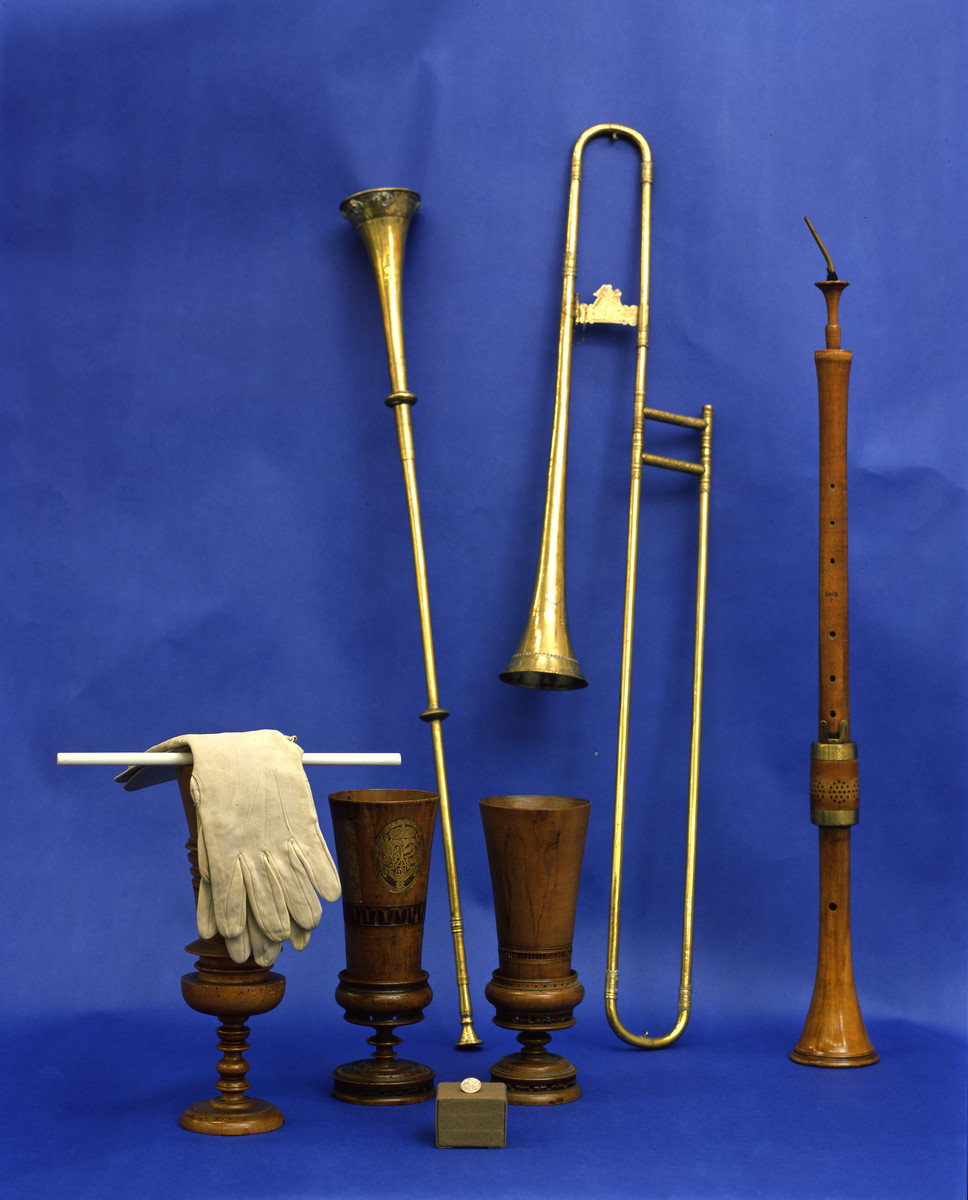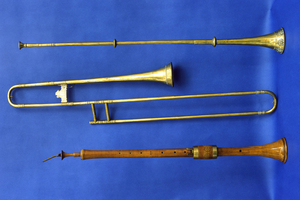News Item | 01. December 2022
NFDI4Culture Music Award: Jury presents Shortlist

Musikinstrumente, Pokale, Handschuhe und Münze zum Pfeifengericht
"historische Blasinstrumente, Pokale, Handschuhe, Münze" s. Bildarchiv Foto Marburg Creator: unknown, Owner: Historisches Museum Frankfurt am Main
The shortlist for the NFDI4Culture Music Award 2022 has been decided!
From all submissions received, the jury consisting of representatives of NFDI4Culture, the Gesellschaft für Musikforschung (GfM), the Deutscher Musikrat and the Zentrum Musik - Edition - Medien (ZenMEM) has now chosen the best projects for publication on a shortlist. On the basis of this shortlist, two submissions - one for each category - will be selected to receive the award. Additionally, the jury has unanimously agreed to publish a special appreciation for one submission that unfortunately could not be accepted due to formal reasons.
The award is given by the musicological community in NFDI4Culture and is intended to recognise music-related or musicological projects and undertakings that contribute in a special way to the goals in the consortium's fields of activity. It is awarded for the first time in 2022.
The awards will be presented at a ceremony during the NFDI4Culture Plenary 2023 (29 - 31 March 2023) at the Akademie der Wissenschaften und der Literatur | Mainz.
Category 1 - Qualification Award (Shortlist, submissions in alphabetical order by name of contributors)
Qualification theses from all music-related subject areas that were completed in 2021/22 were eligible for submission.
Frauke Reglind Pirk (Johannes Gutenberg University Mainz): "Conception and prototypical development of an oXygen-based framework for the edition of Ottoman song texts. Supported by a guideline interview to elicit the prior knowledge of the perspective user group" (Master's thesis 2021).
Technically, the thesis is concerned with the development of a possibility to edit song texts in TEI-XML, eliminating the up to now error-prone export and conversion from a proprietary editing program. In terms of research organisation, the thesis is also concerned with how TEI-XML conformant editing tools can be successfully implemented in projects that primarily applied analogue forms of editing. The thesis is supported by a needs-oriented user survey in guided interviews in order to identify and overcome possible hurdles.
Lars Schmedeke (University of Hamburg): "Bass Drop! - The Bass in Modern Popular Dance Music" (PhD 2022).
In his thesis, the author pursues the question of how modern, popular dance music can be generally systematised. Starting from sounding objects and based on frequency analysis, he especially draws on the criterion of the describable perceivable 'fatness'. The analyses of the values measured are visualised through clustering.
Category 2 - Project Award (Shortlist, submissions in alphabetical order by name of contributors)
Projects of various kinds by cultural workers and scientists from all music-related fields could be submitted.
Ralf Martin Jäger (WWU Münster), Michael Kaiser and Sven Gronemeyer (Max Weber Foundation Bonn): Inter-consortial networking workshop "Critical music and text edition of Ottoman art music".
The aim of the proposed workshop is to place the "Corpus Musicae Ottomanicae" (CMO) project at the centre of an inter-consortial discussion between NFDI4Culture and Text+ in order to identify synergies and common goals and to develop joint strategies. The CMO project is particularly suitable for this purpose, as it encompasses tangible and intangible cultural assets as well as instrumental and vocal music, poetry and performative aspects, thus sharing research data domains from both consortia.
Lukas Retschmeier (TU Munich): Prototype of a user interface for AI-supported bar recognition of digital music records.
The project aims to further develop and visualise a prototype of a tool for the automated clocking of music manuscripts and prints that was created as part of a master's thesis. For this purpose, the AI model based on Tensorflow will be extended for further use.
Maximilian Rosenthal (HMT Leipzig/SLUB Dresden): Database of music publishers
The database of music publishers is developed as part of the DFG project "Geschmacksbildung und Verlagspolitik" (Musical Taste and Publishers' Policies) is intended to contain information from 20,000 business books of music publishers including the date and amount of editions, sales and misprinted paper. The database - also in its technical set-up - serves to make available and connect a considerable corpus of 19th century music production.
Special appreciation of the jury for one submission
Unfortunately, a paper submitted in category 1 could not be accepted according to the conditions of participation as it was already completed in 2020. However, the jury would still like to explicitly acknowledge its important contribution to research - especially to a digital source philology - and to the goals of NFDI4Culture.
Dr. Anna Plaksin (Johannes Gutenberg University Mainz): "Modelle zur computergestützten Analyse von Überlieferungen der Mensuralmusik. Empirical text research in the context of phylogenetic procedures" (PhD thesis 2020).
In her dissertation, the author deals with the development of automatable procedures for comparisons of readings of mensurally notated vocal polyphony around 1500 on the basis of an intensive and multi-layered survey of requirements. The aim is to better understand transmission processes in this repertoire, which has not yet been widely explored on the basis of analyses of formalisable aspects of the surviving documents themselves (i.e. not their abstract content, i.e. the "work text", but to a certain extent its "visual" form). The dissertation shows its innovative content not only in the consistent attempt to expand the "mensural music" module of the MEI beyond semantic coding to include specific aspects and metadata describing the notation, but also in its interdisciplinary approach, in which the author transfers procedures for DNA and protein sequencing from bioinformatics to the observation of variant formation in music. In this way, she illustrates in the best possible way the transdisciplinary approaches of Digital Humanities and at the same time points to future collaborative perspectives for music and edition studies.
